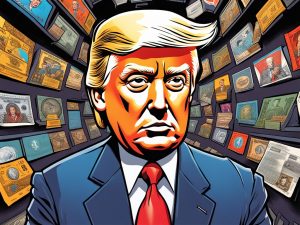Are South Korea’s New Crypto Policies a Game Changer for Investors?
Alright, let’s dive into some pretty exciting news coming out of South Korea! If you’ve been keeping an eye on the crypto landscape, you know that regulation can make or break the market’s vibes. And with South Korea now starting to relax its restrictions on institutional crypto trading, we’re looking at some massive potential shifts. So, what exactly does this mean for the crypto market? Let’s break it down!
Key Takeaways:
- South Korea is easing restrictions for institutional crypto trading.
- The Financial Services Commission (FSC) plans to begin with non-profit organizations.
- New regulations will improve investor protection and combat unfair practices.
- This could pave the way for increased institutional investment in crypto.
- The country aims to align its regulations with global standards.
A Shift in the Winds for Institutional Traders
So, here’s the scoop: The Financial Services Commission (FSC) in South Korea is rolling out a new plan to gradually give institutions access to local crypto exchanges. Historically, South Korean banks had strict guidelines restricting institutional trading. Even though there wasn’t an outright ban, it wasn’t exactly easy for institutions to dip their toes in the crypto waters. Only retail traders could engage, and let me tell you, they’ve been having all sorts of fun!
But wait, there’s more! The FSC is not just sitting back and relaxing. They’re teaming up with the Digital Asset Committee to unlock additional phases of institutional access, which could potentially spark a new wave of investment into the crypto market. Imagine this: major organizations being able to trade and invest in cryptocurrencies just like retail traders have been doing for years. Sounds pretty wild, right?
Improved Investor Protection is on the Horizon
Now, if you’re wondering, "Why should I care?"—it’s because the framework being put in place isn’t just about trading. It aims to ratchet up protections for average investors. The FSC is building on the Virtual Asset User Protection Act they enacted last year, focusing on safeguarding investors and tackling unfair trading practices. This law mandates that exchanges must store user funds in secure financial institutions and keep a reserve in cold wallets. That’s a win for anyone worried about crypto security!
- Some benefits of these regulations:
- Banks must hold user funds safely.
- Cold storage minimizes hacking risks.
- Insurance against losses adds another layer of safety.
Plus, they’re planning to expand this act to cover stablecoins, exchanges, and token listings—basically, painting a fuller picture of how the crypto landscape should look moving forward. It’s like leveling up in a video game; each new regulation adds more strength to the environment, making it safer and more rewarding for users.
Aligning with Global Regulations
Let’s take a step back and look at what’s happening globally. Kwon Dae-young, the FSC Secretary-General, has indicated that South Korea aims to harmonize its regulations with global standards. This almost feels like South Korea is calling out to other nations, saying, “Hey, let’s play nice!” It’s crucial for gaining legitimacy in the international crypto arena, and it could set the stage for other countries to follow suit. As institutional players begin to invest, it could trigger a significant uptick in crypto adoption.
The Road Ahead: Challenges and Opportunities
Now, before we get too carried away, it’s not all sunshine and rainbows. Yes, there are reforms in progress, but South Korea’s political climate has often posed challenges. For instance, back in December 2024, political upheaval led to halting key legislative priorities. This means that while we’re seeing push and pull in the market, it could also present a bumpy road ahead for crypto regulations.
So, here’s the deal—if you’re considering jumping into crypto investments, keeping a close watch on South Korea’s evolving policies could be a smart move.
Practical Tips for Investors
As you ponder your entry into this brave new crypto world, here are some practical tips:
- Stay Informed: Keep an eye on updates about South Korean regulations—this could influence the global market.
- Diversify Your Portfolio: Don’t put all your eggs in the crypto basket. While things may look bright in South Korea, always hedge your bets.
- Assess Risks: With these new policies, understand that the crypto landscape is still volatile. Ensure you’ve got a clear risk management strategy.
- Use Reliable Exchanges: Make sure you’re using exchanges that comply with local regulations to minimize risks.
Final Thoughts
In closing, with South Korea’s move to ease crypto trading restrictions, we’re set for a transformative period in the crypto market that could amplify institutional investments. It’s a thrilling time to be involved!
So, I leave you with this question: How do you think these changes will shape the future of crypto trading not just in South Korea, but globally? Are we on the brink of a new era, or could there be hurdles that keep it from happening? Let me know your thoughts!





 By
By
 By
By
 By
By
 By
By
 By
By
 By
By